Research Highlights
Virology
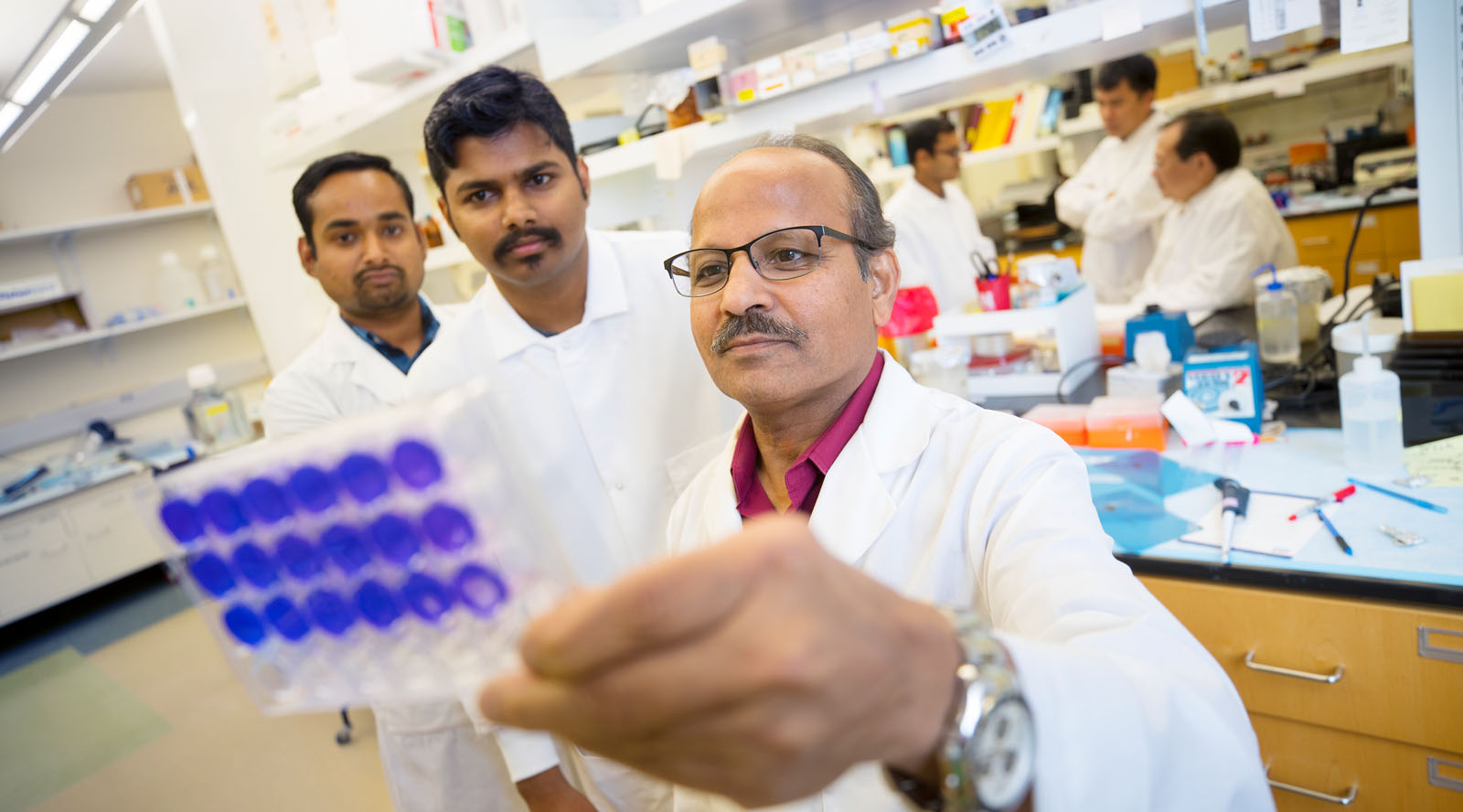
assistants Bikash R. Sahoo and Arun S. Annamalai
Uncovering Zika Mutation
Nebraska virologists have identified a Zika mutation that may help explain why the virus became more lethal during the Western Hemisphere’s 2015 and 2016 outbreaks. The mosquito-borne pathogen evolved from a mild ailment to a deadlier disease that causes birth defects and neurological impairments. A multidisciplinary team affiliated with the Nebraska Center for Virology found that the mutated virus contains a sugar in its encapsulating protein that allows the virus to pass from the bloodstream to the brain in mice, where it’s more likely to cause inflammation and death. The findings could help explain the outbreak’s dramatic increase in microcephalic births, said Asit K. Pattnaik, professor of veterinary medicine and biomedical sciences. If the virus passes from mother to fetus, it could prevent fetal brains from developing properly. Other factors also have been found to contribute to Zika’s increasing pathogenicity. The findings were published in the Journal of Virology.
Health
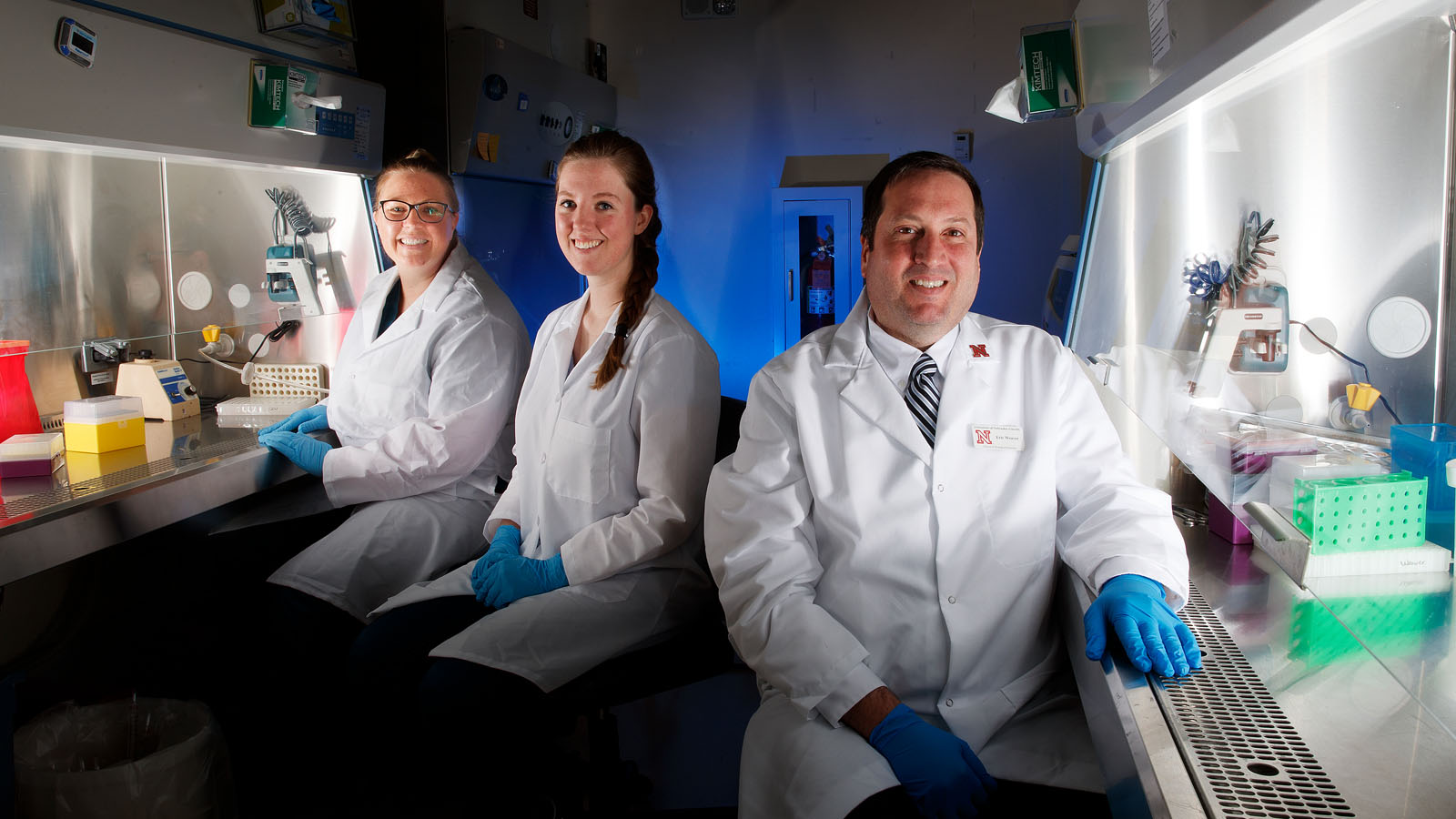
Promising Flu Vaccine
Nebraska Center for Virology researchers have developed a vaccine that may help lead to long-lasting immunity against influenza. Flu viruses mutate frequently, necessitating yearly vaccines that are less than 60 percent effective in a good year. Researchers developed a vaccine that combines multiple genes shared at the ancestral level of flu strains circulating today. The vaccine successfully protected mice against lethal doses of seven of nine widely divergent flu viruses. While too soon to say the approach would be successful in humans, it’s a promising avenue toward a universal flu shot, said project leader Eric Weaver, assistant professor of biological sciences. An estimated 40 million Americans contracted influenza during the 2015-2016 season, resulting in nearly 1 million hospitalizations, according to the Centers for Disease Control and Prevention. The study was published in Scientific Reports. The National Institutes of Health funds this research.
Brain Research
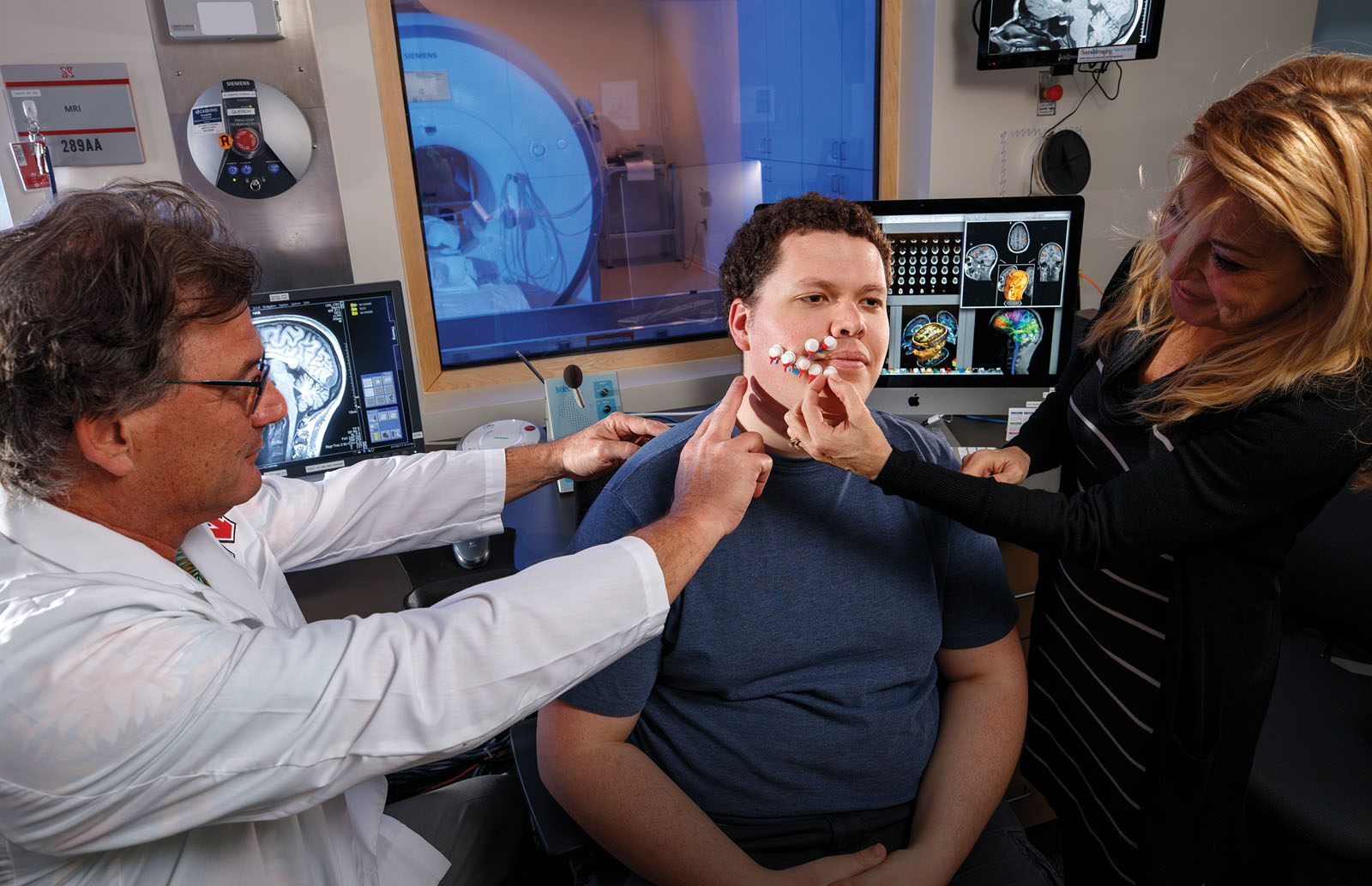
Study Shows Stroke Treatment Effective
When a stroke hits, brain damage begins. Nebraska’s Steven Barlow invented a device that noninvasively stops further damage. Barlow’s team has published the first in a series of studies demonstrating its Galileo TAC-Cell Array’s effectiveness as a potential emergency room treatment. The machine produces air pulses at supersonic speeds to create a nerve response. When applied to the skin in specific patterns and speeds, Galileo activates the brain’s cerebral cortex and cerebellum and increases blood flow. The study, published in the journal PLOS One, establishes best practices for treating stroke victims by examining effects of Galileo stimulation in healthy adults. To gain U.S. Food and Drug Administration approval, Barlow has partnered with the University of Nebraska Medical Center to demonstrate efficacy in a clinical setting. Barlow, Corwin Moore Professor of Special Education and Communication Disorders, is associate director of the Center for Brain, Biology and Behavior.
Performance
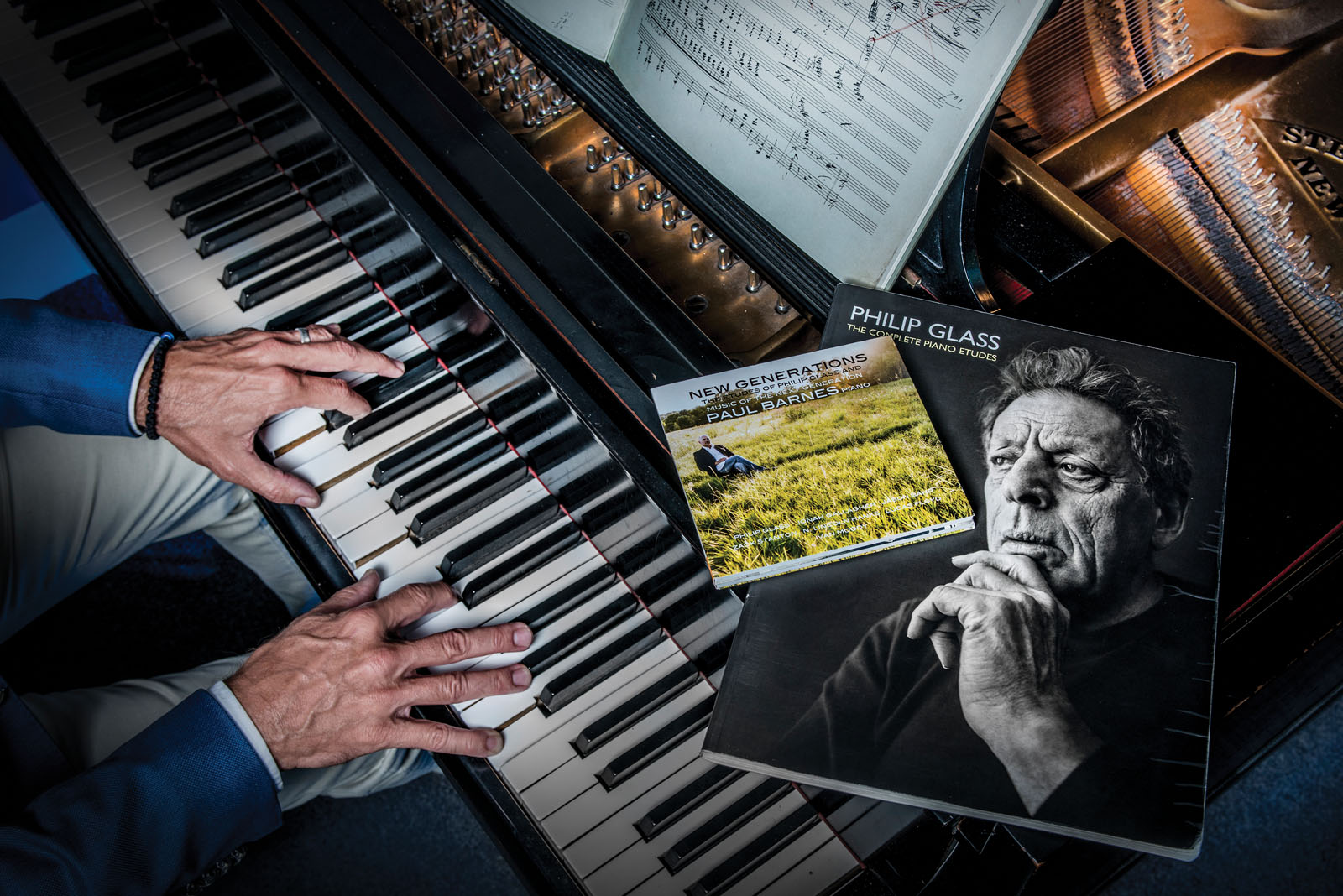
Glass’ “Annunciation” Premieres
A 24-year friendship between Nebraska’s Paul Barnes and world-renowned composer Philip Glass brought the world premiere of Glass’ new piano quintet “Annunciation” to Nebraska. It was part of a 2018 concert, “A Celebration of Philip Glass,” at the Lied Center for Performing Arts. Glass attended the concert. Barnes and the Chiara String Quartet performed “Annunciation,” which is based on a Greek Orthodox communion hymn for the Feast of the Annunciation. The concert included other Glass pieces, Byzantine chant performed by vocal ensemble Cappella Romana and a performance of Glass’ Piano Concerto No. 2 “After Lewis & Clark” featuring Native American flute player Ron Warren and the university’s Symphony Orchestra. Barnes, Marguerite Scribante Professor of Music, has collaborated with Glass since 1995. “Annunciation” originated from one of their earliest conversations. Barnes retains exclusive rights to the piece for two years.
Sustainability

Estimating Urban Water Use
As towns and cities grow, community planners need effective tools to manage urban water resources. Nebraska researchers and state natural resources experts have developed a novel method for estimating future residential consumptive water use – the water that isn’t recycled. The method will help planners design more water-efficient and drought-resilient residential areas. The approach is faster and more cost-effective than is currently available, said project leader Zhenghong Tang, who holds the Hyde Architectural Professorship. To estimate urban consumptive water use in populated areas, the method pairs water use data with high-resolution aerial images gathered from geographical information systems. The images reveal landscape features that directly affect water loss. “It is critical to plan for population and industry growth in urban areas when developing integrated water management plans,” Tang said. The study was published in the journal Sustainable Cities and Society.
Defense
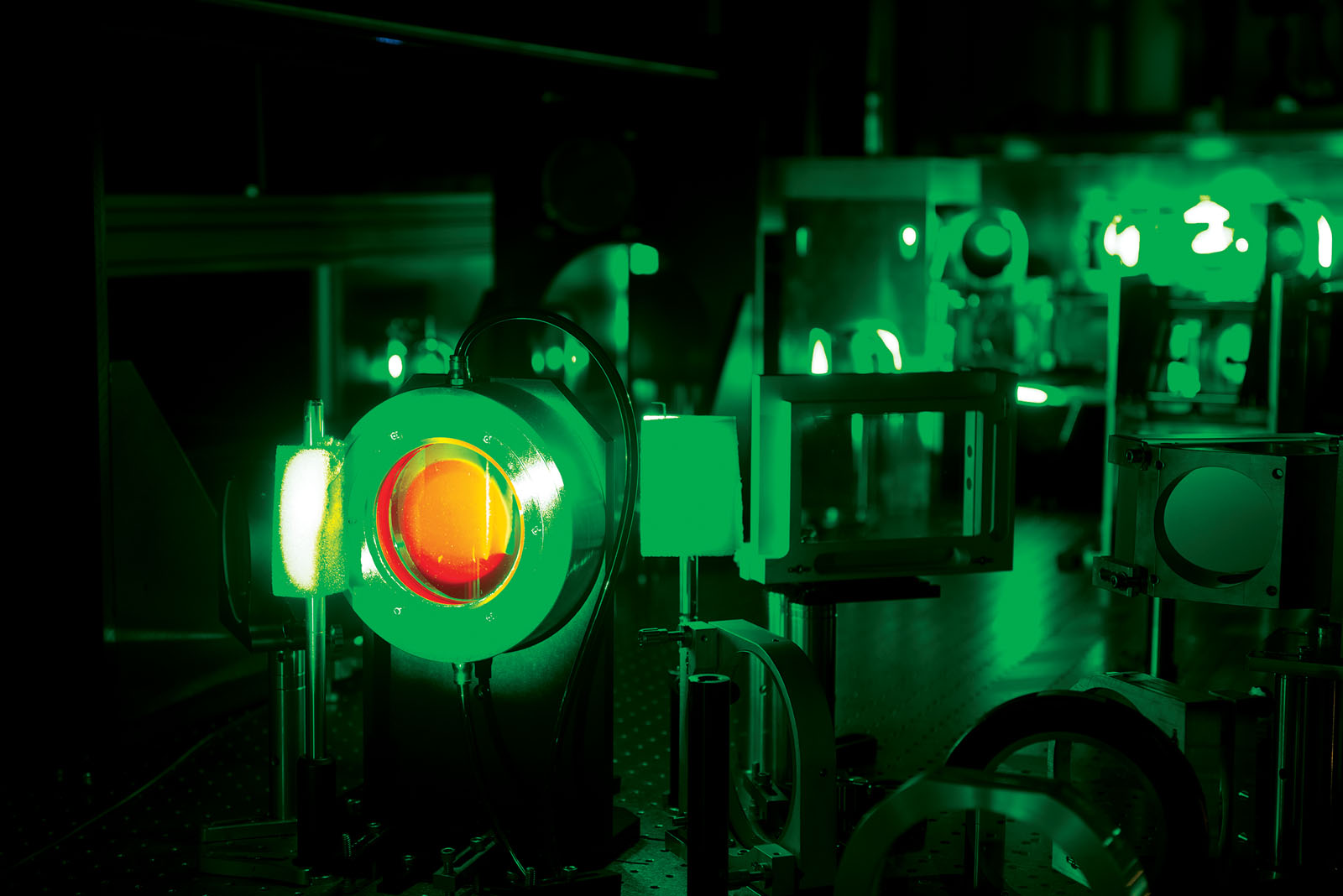
NSRI Earns New Contract
The University of Nebraska’s National Strategic Research Institute received a new five-year, $92 million contract from the U.S. Air Force to continue researching methods to combat weapons of mass destruction and protect the nation and its allies. The contract allows NSRI, a partnership with U.S. Strategic Command, to expand research across all four Nebraska campuses. NSRI focuses on five core areas: nuclear detection and forensics, detection of chemical and biological weapons, passive defense against weapons of mass destruction, consequence management and other mission-related research. Since its founding in 2012, NSRI has engaged more than 241 Nebraska faculty, researchers and students from numerous disciplines on more than 80 research projects. The institute is one of 13 university-affiliated research centers nationally. “Our continued momentum and NSRI’s unique focus are delivering results on behalf of Nebraskans and all Americans,” said Chancellor Ronnie Green.
Media

Testing Limits of Virtual Reality Education
Nebraska researchers, working with Nebraska Educational Telecommunications, are testing the limits of virtual reality education by merging VR with 360-degree video. The team is developing a mini walking tour of Lincoln’s Centennial Mall, the first step in a project focusing on Nebraska history, VR and distance education. The work combines the expertise of Adam Wagler and Michael Hanus, assistant professors of advertising, with the resources and production quality of NET. They’re using a drone to capture scans that provide a digital 3D model of Centennial Mall. The team will use the model to create a VR tour. Audio and video additions educate viewers about the mall’s historic sites. NET is developing the walking tour into a user-friendly app. The team is assessing users’ feelings about virtual tours and how they consume content. The project helps advance the VR industry.
Sociology
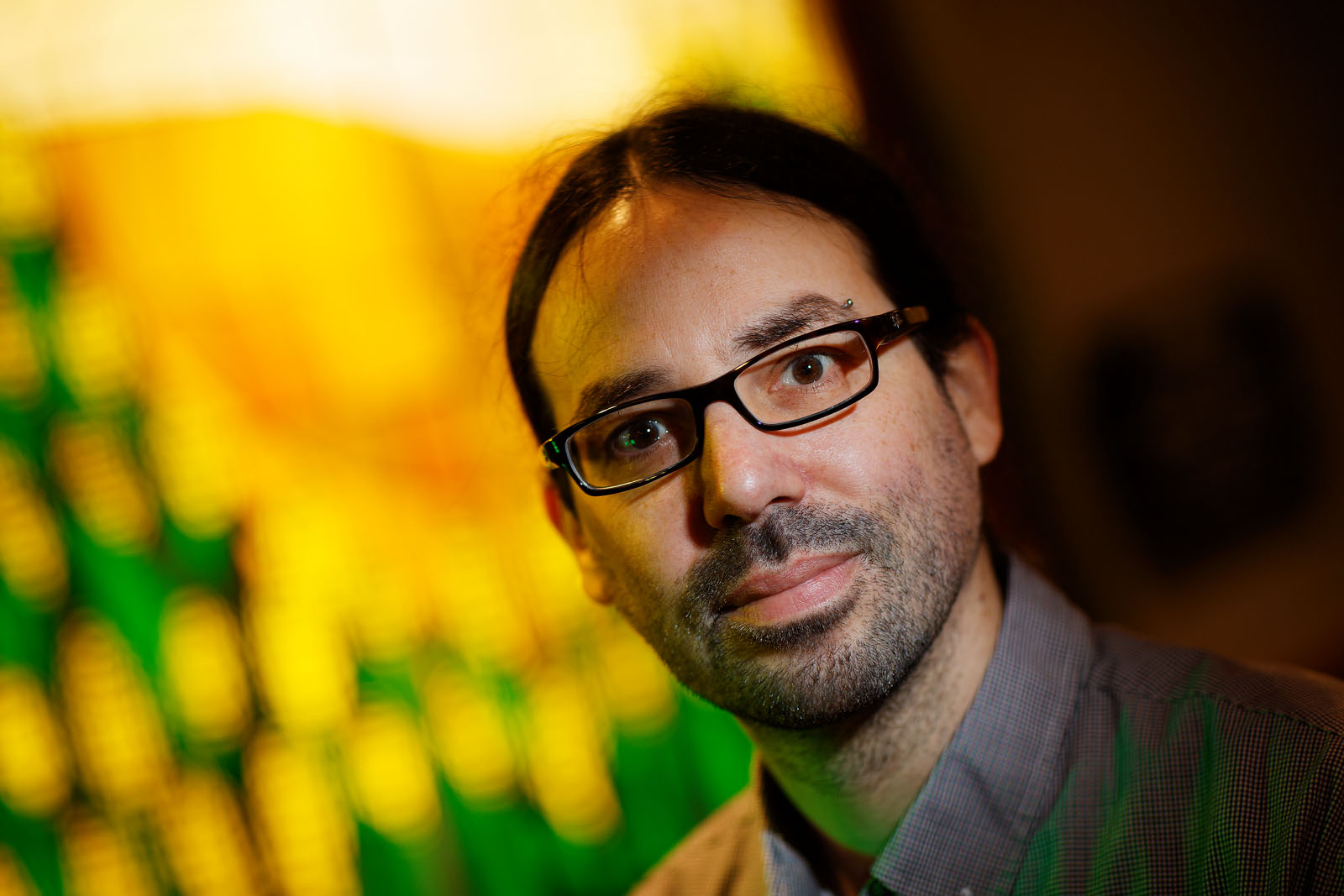
Younger Americans More Tolerant
Younger Americans are more likely than older generations to support rights for stigmatized groups, according to a Nebraska study. It’s a surprising result, said sociologist Philip Schwadel, the study’s co-author. Previously, supporting civil rights broke along class lines, with more support likely as income and education levels rose. The study suggests social status no longer plays an outsize role in predicting political tolerance. Instead, it’s diffused along generational lines. Researching nearly 40 years of data from the General Social Survey, Schwadel and his University of Science and Arts of Oklahoma co-author found income and education still play some role, but they have diminished considerably. Younger people growing up with more exposure to diversity through television and social media may explain the shift, Schwadel said, adding that political tolerance likely will grow as future generations come of age in a more progressive society. The study was published in Sociological Forum.
Political Science
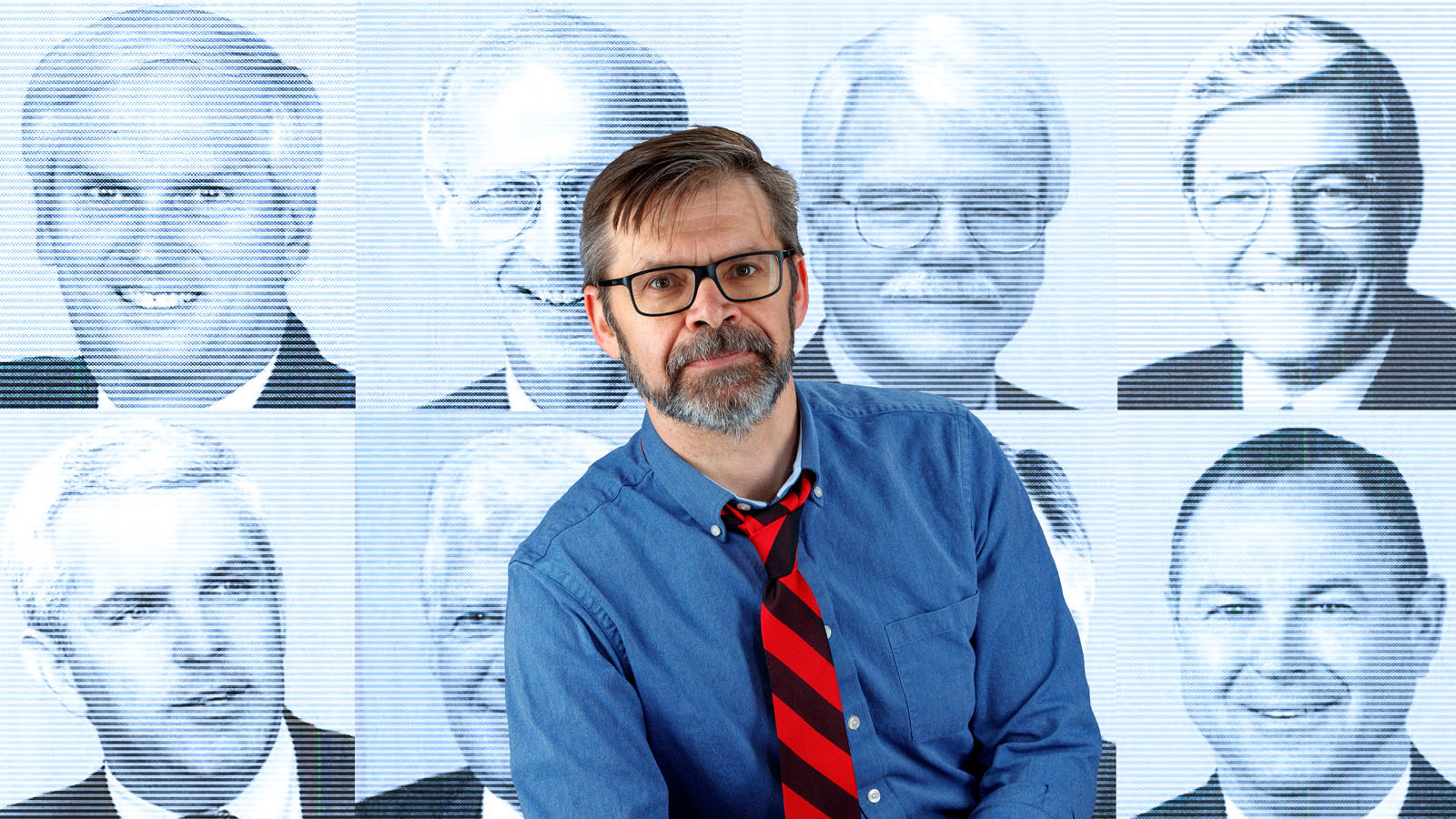
Red or Blue – the Face Shows
Conservatives show less emotion than liberals, according to a Nebraska study that found a correlation between political ideology and facial expressivity. Previous research revealed that people could identify political affiliation from faces alone, but not why. The study found it’s likely in part because liberals have more facial emotional expressivity, said study co-author Kevin Smith, Leland J. and Dorothy H. Olson Chair of Political Science. The study consisted of four components: a survey in which liberals self-reported as more emotionally expressive; measurements that demonstrate liberals activate their facial muscles more; and two studies in which participants viewed politicians speaking, without sound, that found emotional expressivity correlates with both perceived and actual political orientation. Politicians with more emotional facial expressions were perceived as more liberal. John Hibbing, Foundation Regent University Professor of Political Science, co-authored the study, which was published in Politics and the Life Sciences.
Ethnic Studies

Understanding Multiethnic Experiences
As the number of Americans with multiple ethnic or racial backgrounds increases, a Nebraska study helps improve understanding of how diverse backgrounds shape people’s identities and interactions with others. Debunking common misconceptions, the study found many multiethnic and multiracial individuals have a strong sense of self. Connections to different races and ethnicities provide an awareness and enhanced understanding of others’ experiences. But study participants also discussed feeling disconnected in some situations because of how they’re perceived. Societal misconceptions, lack of knowledge regarding diverse backgrounds and absence of recognition adds a layer of difficulty and leads to a lack of role models. The study, led by Jordan Soliz, associate professor of communication studies, included interviews with 29 adults, ages 18 to 52. The research helps those working with diverse groups better understand the distinct experiences of being multiethnic, Soliz said. The study was published in the journal Identity.
Animal Care

University Earns AAALAC Reaccreditation
The university’s animal care program has been reaccredited by the Association for Assessment and Accreditation of Laboratory Animal Care International, a nonprofit organization that ensures high standards of laboratory animal care and use. In addition to compliance with laws regulating the use of animals in research, AAALAC accreditation requires extra efforts to achieve animal care excellence. Kelly Heath, director and attending veterinarian for Nebraska’s Institutional Animal Care Program, led the animal care team through the rigorous reaccreditation process, which occurs every three years. It requires updating a self-evaluative report submitted for original accreditation and a three- to four-day on-site evaluation of the institution’s animal care and use program. The reaccreditation covers all 16 university-affiliated animal care sites statewide. Nebraska, which first earned full accreditation in 2014, is one of more than 980 AAALAC-accredited organizations worldwide.
Community

Harnessing Superfast Internet
The university is helping Lincoln take advantage of superfast internet speeds to better address community needs. Lincoln is one of more than 25 national and international communities participating in US Ignite’s Smart Gigabit Communities program. The goal of the nonprofit, funded by the National Science Foundation, is to help cities embrace next-generation internet technology to improve economic and social opportunities, such as education, workforce development, transportation and health. Nebraska computer scientists and engineers, along with the university’s Holland Computing Center, are partnering with city officials, a local telecommunications company and other private entities to build a digital infrastructure that supports entrepreneurs. As a Smart Gigabit Community, Lincoln agreed to develop two applications or services using gigabit technology. The university is helping the city realize its first project: developing software that accesses unused wireless signals, allowing radios to broadcast on and listen to multiple frequencies.
Teaching
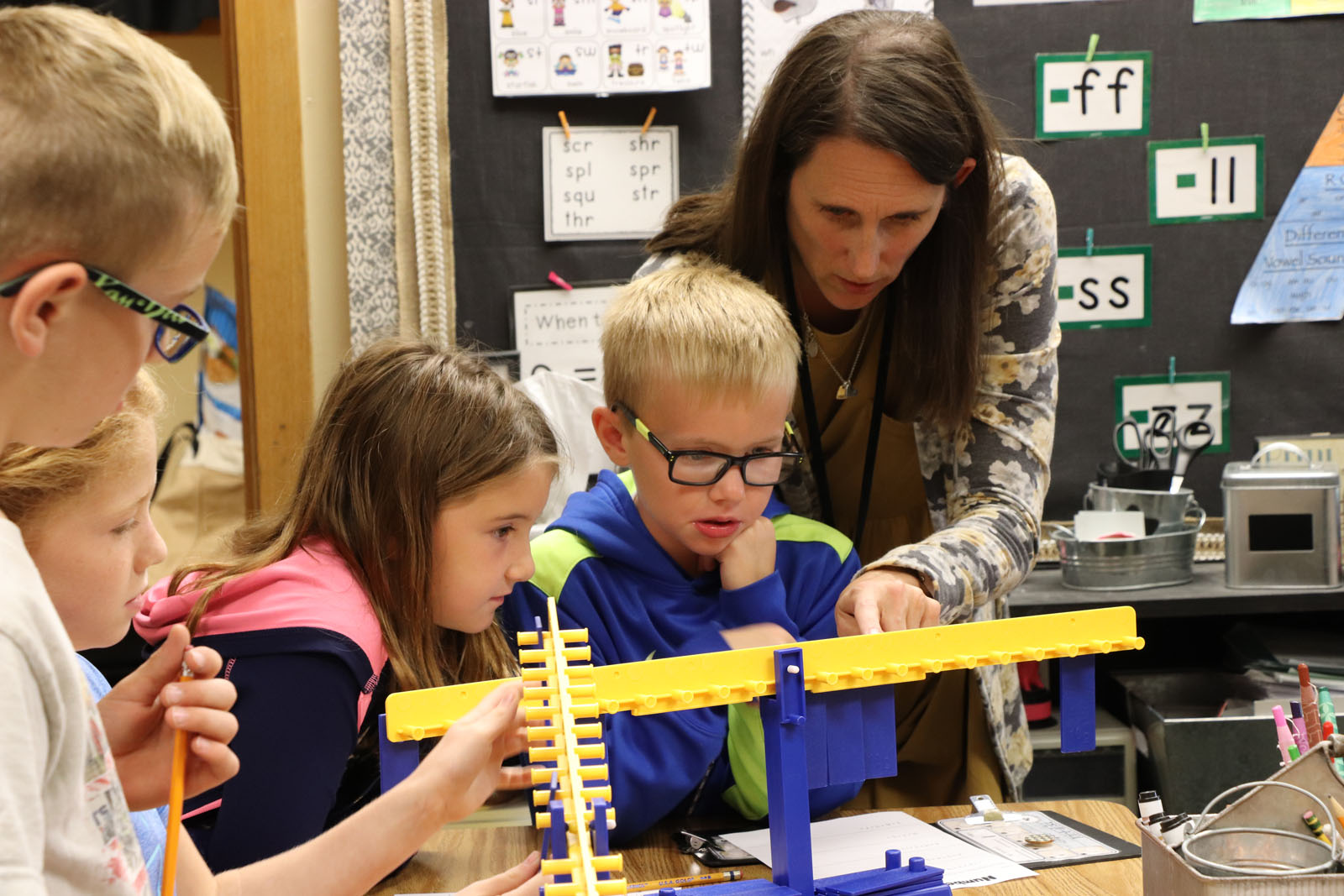
Enhancing Rural STEM Education
Elementary school instructors teaching STEM in rural Nebraska face unique obstacles, including a lack of specialized training, professional leadership and mentoring. But robust instruction in science, technology, mathematics and education is critical for the state’s K-6 students, as Nebraska ranks in the top fifth of the U.S. for increases in STEM occupations. To fill this gap, a Husker research team led by mathematics education expert Amanda Thomas is launching NebraskaSTEM. Through the program, 15 elementary teachers from high-needs rural schools will participate in a fiveyear Master Teaching Fellows program, receiving professional development opportunities, mentoring and salary supplements. Participants will earn either a master’s degree or complete other graduate coursework through the program. They’ll implement high-quality STEM instruction in their classrooms and serve as local STEM leaders. The project will impact approximately 1,500 K-6 students. The National Science Foundation’s Robert Noyce Scholarship Program funds this project.
Early Childhood
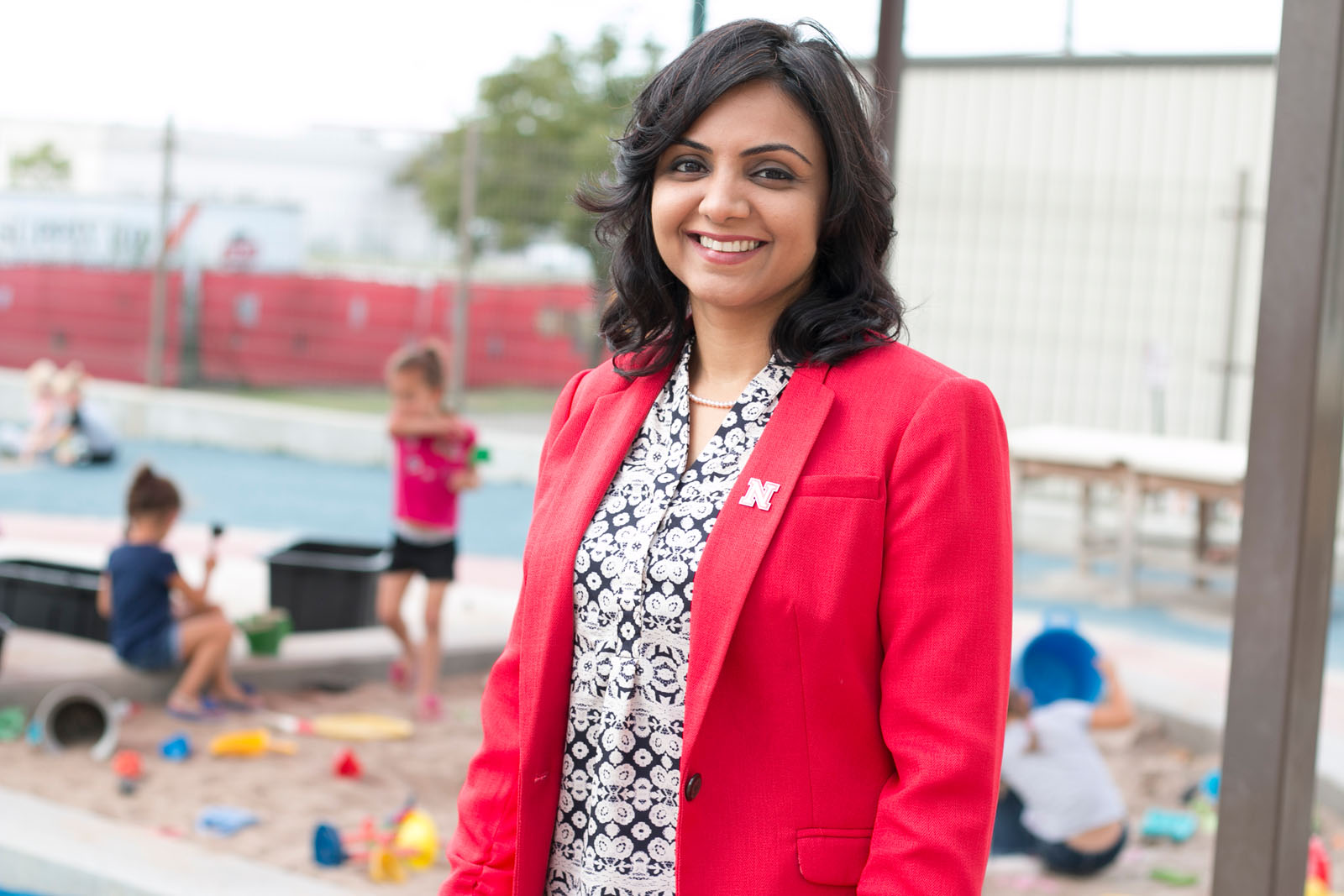
Combating Childhood Obesity
Dipti Dev’s work to combat childhood obesity was honored with an Early Achievement Award from the U.S. Department of Agriculture’s National Institute of Food and Agriculture. The award recognizes early career extension professionals who are making strides through extension programs and whose influence and reputation extend beyond their state. Dev, the Betti and Richard Robinson Assistant Professor of Child, Youth and Family Studies and a Nebraska Extension specialist, was recognized for her policy and environmental approaches to decreasing childhood obesity. She is collaboratively developing the research-based, online Ecological Approach to Family Style Dining program, which trains childcare providers to improve the mealtime environment and improve children’s diets. Dev also is developing a social media tool kit for extension professionals, enabling them to use social platforms to positively influence children’s food choices.
Leadership
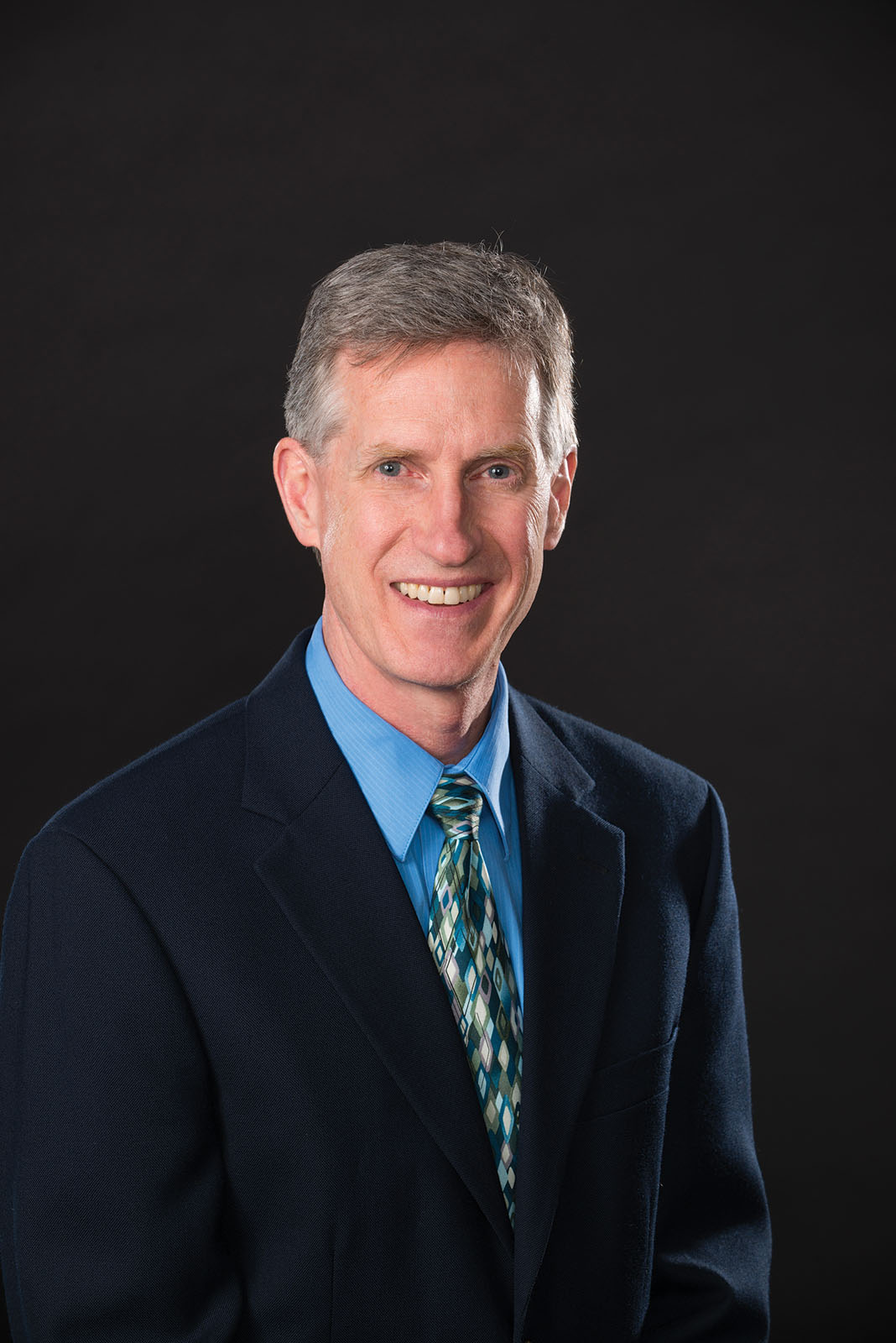
Carr Leads Graduate Education
Tim Carr became associate vice chancellor and dean of graduate education in June 2018. He had served as interim dean of graduate education since April 2017. Previously, Carr was the Jean Sundell Tinstman Professor of Nutrition and Health Sciences and department chair. He also served as acting associate dean of academic affairs in the College of Education and Human Sciences. Carr’s research focuses on cholesterol transport and how dietary factors influence cardiovascular and metabolic diseases. He has consulted with the World Health Organization and private industry. He earned a doctorate in nutritional sciences from the University of Arizona and previously was a faculty member at Wake Forest School of Medicine and the University of Minnesota. As dean, Carr’s responsibilities include setting the strategic vision for graduate education and the Office of Graduate Studies while working with other deans, department chairs and program chairs to advance graduate and postdoctoral education.
Leadership
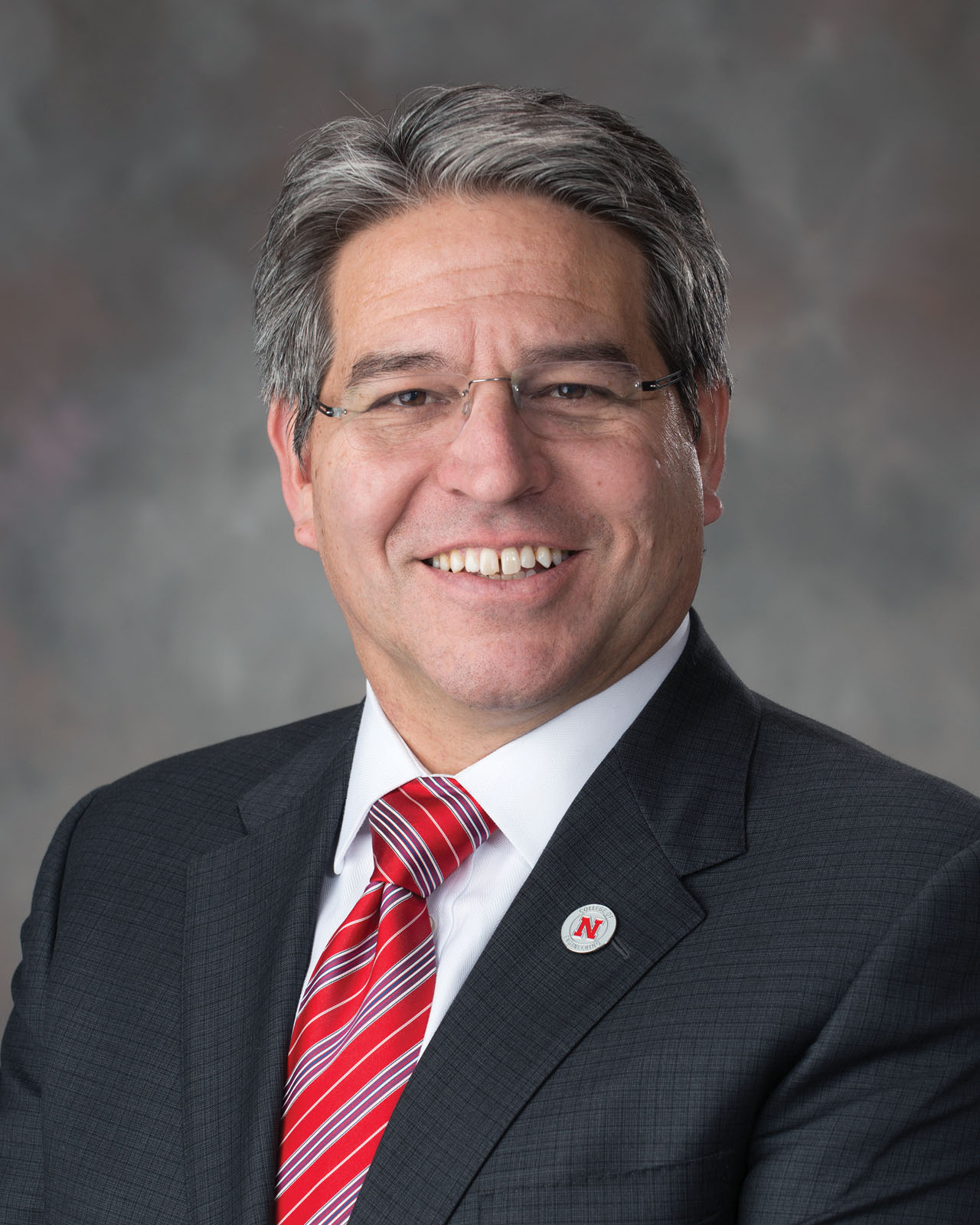
Pérez Named Engineering Dean
Lance C. Pérez became dean of the College of Engineering in May 2018. As the College of Engineering undergoes significant growth in enrollment and faculty positions, Pérez is helping to define and implement a strategic vision and guide new facility construction and renovation. He served two years as interim dean and previously was associate vice chancellor for academic affairs and dean of graduate studies. A Nebraska faculty member since 1996, he is the Omar H. Heins Professor of Electrical and Computer Engineering. From 2008-2010, he was program director in the Division of Undergraduate Education at the National Science Foundation, where he worked on projects involving the National Academy of Engineering and the White House Office of Science and Technology Policy. Pérez’s research focuses on wireless communications, informational processing and engineering education. He earned a doctorate from the University of Notre Dame.
Leadership
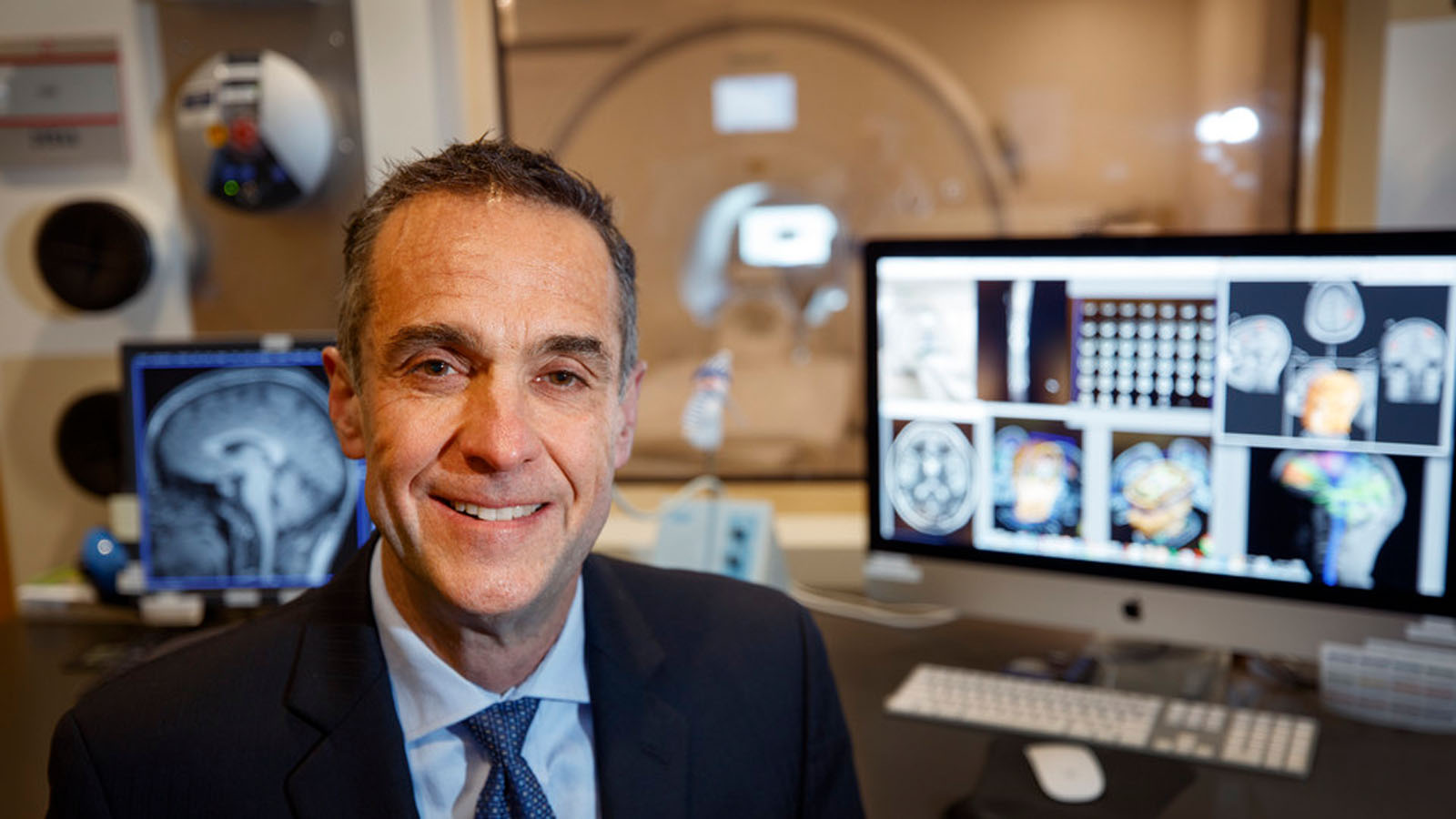
Savage Heads CB3
Cary Savage is the new director and Mildred Francis Thompson Professor of the Center for Brain, Biology and Behavior. He’s impressed with the center’s multidisciplinary approach and is working to raise CB3’s national profile through increased funding and groundbreaking research. Savage joined the university in January 2018. Previously, he was a senior scientist at Banner Alzheimer’s Institute in Arizona. He studies how the brain mediates health behavior with the ultimate goal of determining the best treatment options based on a person’s brain function. Savage also studies traumatic brain injury and said he’s especially excited to strengthen the partnership with Nebraska Athletics and enhance collaborative concussion research. Savage has held academic positions at Harvard Medical School and the University of Kansas Medical Center. He has a doctorate in clinical psychology from Oklahoma State University. Savage succeeds Dennis Molfese, the center’s founding director, and interim director David Hansen.
Leadership
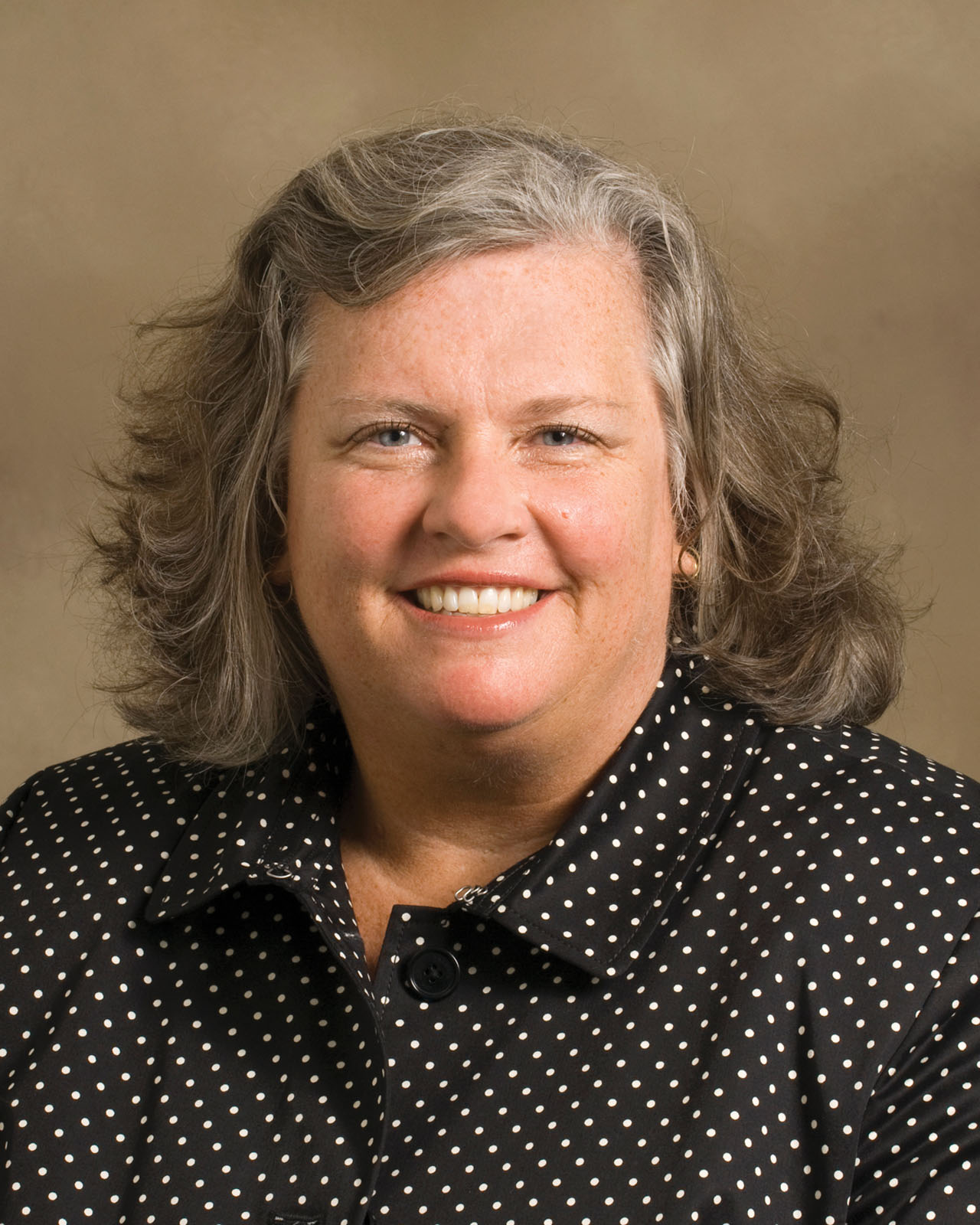
Deb Hamernik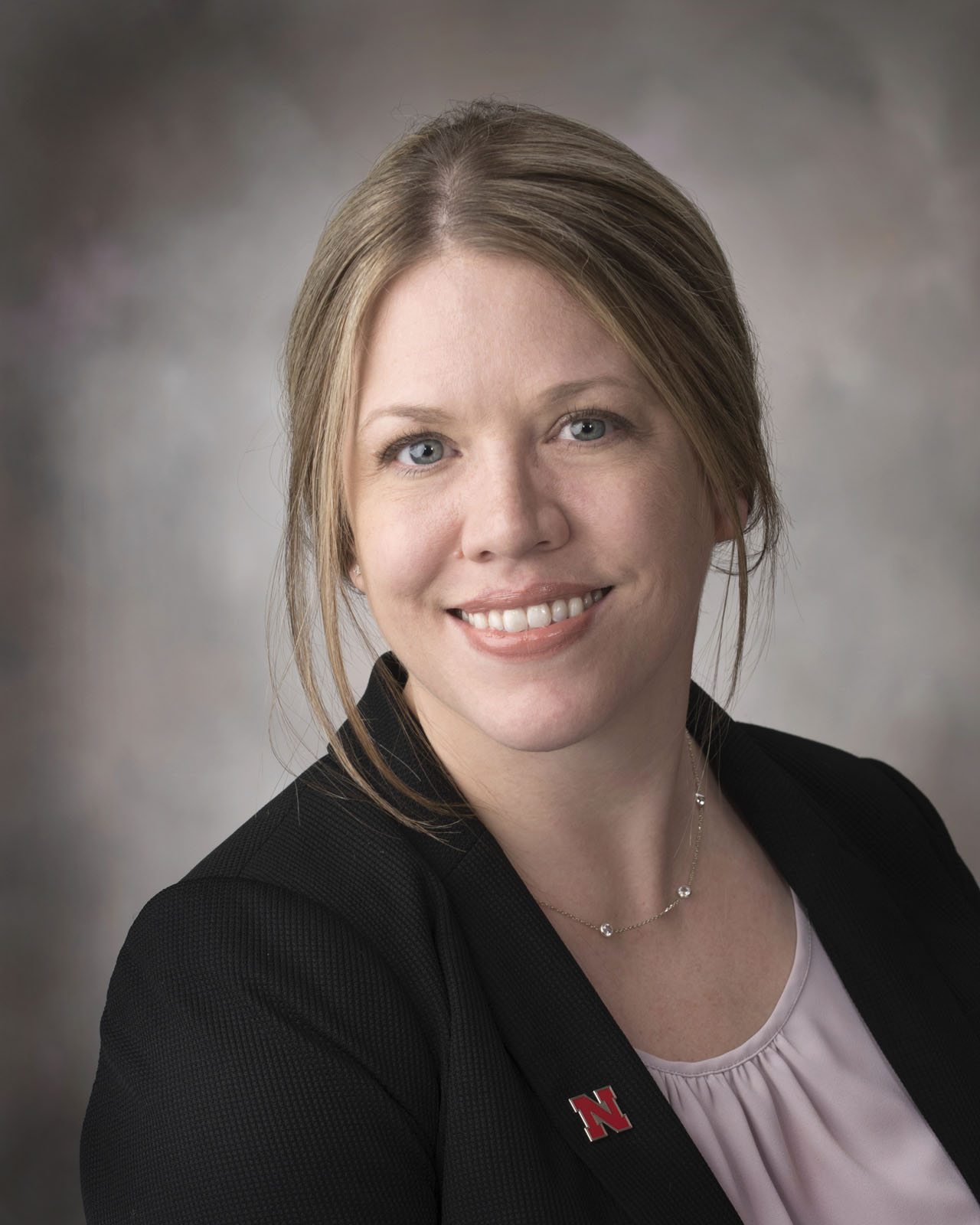
Becky Zavala
Two Join Research Senior Team
Deb Hamernik and Becky Zavala joined the Office of Research and Economic Development’s senior leadership team in 2018. Hamernik became associate vice chancellor for research in October. She oversees faculty development, facilitates faculty networking opportunities with federal funders and collaborates with campus leaders to promote Nebraska’s research mission. Hamernik, a professor of animal science, served as interim associate vice chancellor for research and in several capacities since 2011, and from 2009-2018 was associate dean of the Agricultural Research Division, part of the Institute of Agriculture and Natural Resources. Previously, she was the national program leader in animal physiology for the U.S. Department of Agriculture’s Cooperative State Research, Education and Extension Service. Hamernik earned a doctorate in reproductive endocrinology from Colorado State University. Zavala was named assistant vice chancellor for research in January. She serves as ORED’s chief of staff and oversees business and operations, including sponsored programs, research finance and information systems, events and outreach, and learning and development. Zavala previously served as director of research finance for six years. She holds a master’s degree in business administration from Nebraska.